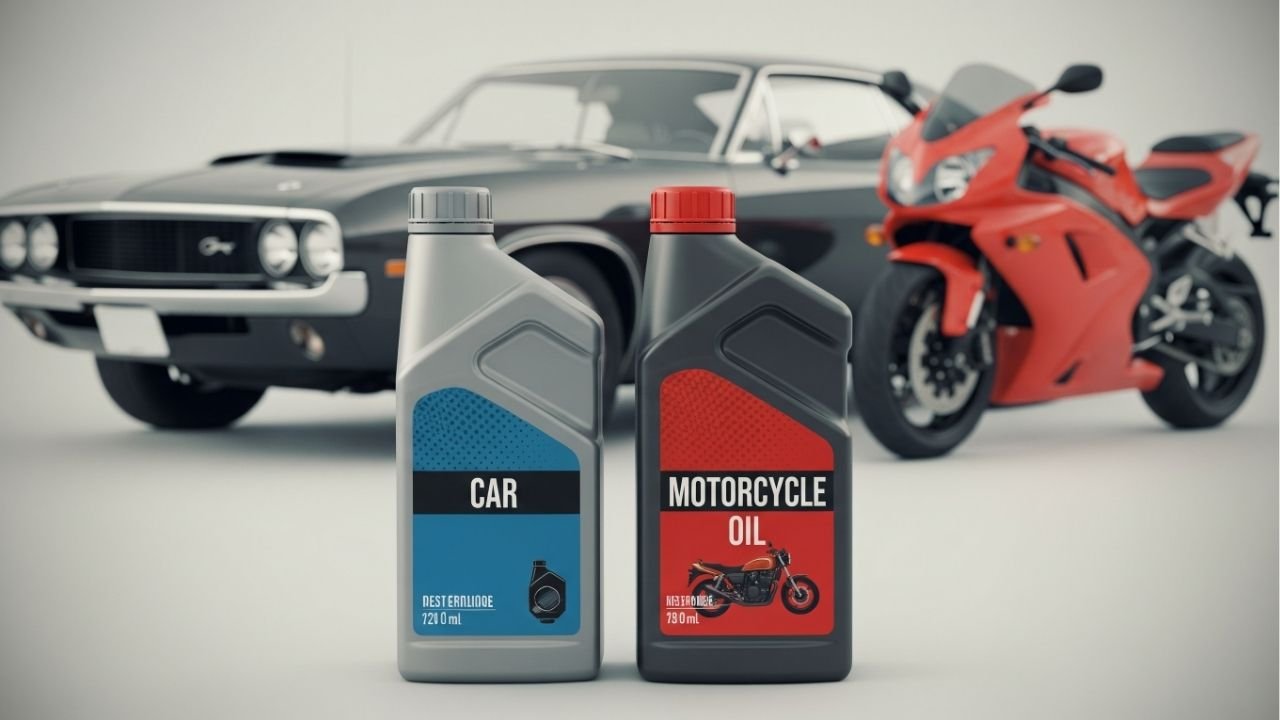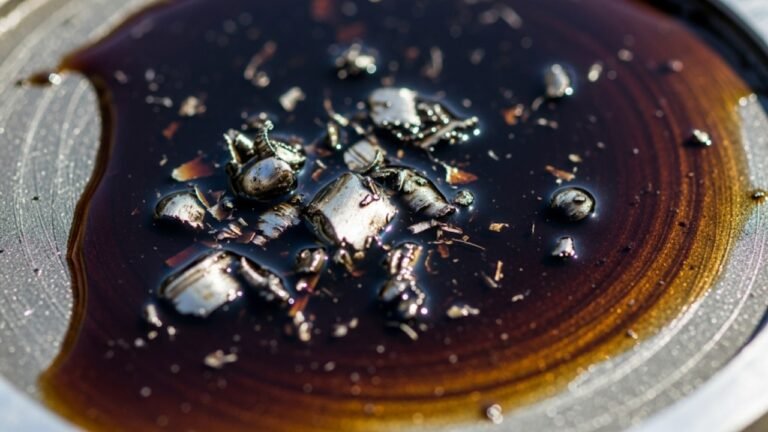Can I Put Car Oil in My Motorcycle?

Have you ever stared at your garage shelf, spotted that bottle of car oil, and wondered, “Can I put this in my motorcycle?” You’re not alone. This is a question that pops up often for bikers—especially if you’re new to the riding scene or just running low on cash and options.
The short answer is: technically yes, but should you? Probably not.
Let’s explore why car oil and motorcycle oil aren’t always interchangeable, how using the wrong one could impact your ride, and what you really need to know before making a decision.
In This Article
- 1 Introduction: Why This Question Even Matters
- 2 Quick Answer with Bullet Points (TL;DR)
- 3 Understanding the Difference Between Car Oil and Motorcycle Oil
- 4 So… Can I Put Car Oil in My Motorcycle Just Once?
- 5 What Happens If I Keep Using Car Oil in My Motorcycle?
- 6 When Is It Okay to Use Car Oil in a Motorcycle?
- 7 How to Check if Your Oil Is Motorcycle-Safe
- 8 Personal Experience: When I Learned the Hard Way
- 9 Which Oil Brands Are Safe for Both Cars and Motorcycles?
- 10 When in Doubt, Read the Manual
- 11 FAQs: Straightforward Answers to Common Concerns
- 11.1 1. Can I put car oil in my motorcycle temporarily?
- 11.2 2. What happens if I keep using car oil in my bike?
- 11.3 3. Is synthetic car oil better for motorcycles?
- 11.4 4. What’s the difference between JASO MA and MA2?
- 11.5 5. Can I mix car oil and motorcycle oil?
- 11.6 6. Can I use diesel engine oil in my motorcycle?
- 11.7 7. Why is motorcycle oil more expensive?
- 11.8 8. What happens if my bike has a dry clutch?
- 12 A Metaphor That Might Help: Shoes and Surfaces
- 13 Final Advice: Trust Your Ride, Don’t Risk It
- 14 Wrap-Up: Should You Ever Put Car Oil in a Motorcycle?
Introduction: Why This Question Even Matters
I’ve been riding motorcycles for over a decade—starting from my old 125cc commuter to a modern 600cc beast. There were times when I thought, “Oil is oil, right?” But after a few missteps and a clutch that slipped like a wet bar of soap, I learned the hard way that oil is more than just liquid in a bottle.
This article is for the everyday rider. Whether you cruise on weekends, commute daily, or tinker with your own bike—you deserve to know the truth behind the “can I put car oil in my motorcycle” dilemma.
Quick Answer with Bullet Points (TL;DR)
-
✅ Car oil can be used in a pinch, but it’s not ideal.
-
❌ Most car oils lack additives needed for wet clutches in motorcycles.
-
Long-term use of car oil in a bike can lead to clutch slippage and engine wear.
-
Motorcycle oils are designed to lubricate the engine, transmission, and clutch together.
-
Car oils often contain friction modifiers that can harm motorcycle clutches.
-
Motorcycle-specific oils are a bit more expensive, but they protect your bike better.
Understanding the Difference Between Car Oil and Motorcycle Oil
Let’s get technical—but not too technical.
Car engines and motorcycle engines don’t operate the same way. Sure, both use oil to lubricate moving parts and reduce friction. But how they use the oil is very different.
What Makes Car Oil… Car Oil?

That’s great for cars—but not so much for bikes. Why? Because many motorcycles use what’s called a wet clutch system. In this system, the clutch is bathed in oil. If the oil is too slippery, like car oil, your clutch might start slipping.
Think of it this way: using car oil in a motorcycle is like putting cooking oil in your shampoo. Both are slippery, but they’re made for different jobs.
Motorcycle Oil: A Multitasker
Motorcycle oil is designed to be a jack of all trades. It lubricates:
-
The engine (like car oil),
-
The transmission (cars have separate transmission fluid), and
-
The clutch (especially in wet clutch systems).
This means motorcycle oils have to be tougher, with stronger shear stability, and without additives that can mess with your clutch.
| Key Feature | Car Oil | Motorcycle Oil |
|---|---|---|
| Wet Clutch Safe? | ❌ Not always | ✅ Yes |
| Friction Modifiers? | ✅ Often present | ❌ Avoided |
| Shear Stability? | ❌ Lower | ✅ Higher |
| Transmission Lube? | ❌ Separate fluid used | ✅ Same oil lubricates it |
| Cost per Quart? | Less expensive | More costly but safer |
So… Can I Put Car Oil in My Motorcycle Just Once?
Yes, but it should be your last resort.
Imagine this: you’re stranded in a small town, no bike shop around, your oil is dangerously low, and all you see is a bottle of 10W-40 car engine oil at the local gas station. In that case? Go ahead—use the car oil temporarily. Just change it out as soon as you can with proper motorcycle oil.
Rule of thumb: One-time use? Possibly okay. Regular use? Big no.
Using car oil repeatedly might result in:
-
Clutch slippage (that “revving but not moving” feeling)
-
Increased engine wear
-
Overheating issues
-
Loss of torque performance
And no, it’s not just marketing hype. I once used regular automotive oil in my old Yamaha FZ thinking I was being smart. Three weeks later? My gear shifts felt like stirring concrete, and the clutch plates wore out faster than cheap shoes in the rain.
What Happens If I Keep Using Car Oil in My Motorcycle?
Think of your motorcycle as a tight-knit family. The engine, clutch, and transmission all share the same home—the oil bath. Now, imagine introducing a guest (car oil) who doesn’t get along with everyone.
Over time, here’s what may happen:
1. Clutch Slippage
Friction modifiers reduce resistance. Great for cars, but a nightmare for wet clutches. Your bike will rev without moving much—like spinning your tires on ice.
2. Gear Shifting Problems
Motorcycle transmissions are rougher than car ones. They need oil that can withstand high-pressure metal-on-metal contact. Car oils tend to break down under shear (i.e., intense pressure between gears).
3. Engine Overheating
Motorcycles run hotter than cars due to their compact design. Car oils may not handle these temps well, leading to thermal breakdown.
4. Long-Term Engine Wear
Since car oil isn’t designed to lubricate transmissions or clutches, its protective properties can degrade faster—leading to higher metal wear and eventual engine damage.
When Is It Okay to Use Car Oil in a Motorcycle?
Let’s not be too dramatic. There are some scenarios where you might use car oil safely:
✅ If your bike has a dry clutch
Some high-performance or older motorcycles (like certain BMWs or Ducatis) have dry clutch systems. That means the clutch isn’t soaked in oil—so the risk of slippage is minimal. But still, the oil must be high in shear stability for the transmission.
✅ Short-term emergency use
If you’re out of town, can’t access proper bike oil, and just need to get home—yes, car oil will do for the moment.
✅ Using specific car oils labeled “motorcycle safe”
Some automotive oils are certified for use in motorcycles. Look for the JASO MA or MA2 rating on the label.
Tip: If the label says “Energy Conserving” or “Resource Conserving,” skip it. Those oils usually have friction modifiers.
How to Check if Your Oil Is Motorcycle-Safe
This is gold. Here’s a quick checklist to keep by your side before pouring anything into your engine:
Look for these specs on the label:
-
JASO MA / MA2: Safe for wet clutches.
-
API SL / SN / SJ: Compatible with many engines.
-
Avoid oils labeled “Energy Conserving”.
-
Check viscosity ratings: 10W-40 or 20W-50 are common for bikes.
Personal Experience: When I Learned the Hard Way
Let me share a quick story.
Back in college, I had a trusty old Honda CB125. One summer, on a long ride across countryside roads, I ran out of oil (yep, I forgot to check). The nearest shop? A rural gas station with dusty shelves and zero motorcycle oils.
Out of panic, I poured in Castrol GTX 10W-30 car oil. The bike ran fine—for a day. Then came the rough shifting. Eventually, the clutch refused to grip during traffic stops. Lesson learned.
That little mistake cost me a new clutch kit and some precious riding time.
Which Oil Brands Are Safe for Both Cars and Motorcycles?
Sometimes you might stumble upon an oil that says it’s good for both cars and motorcycles. Sounds too good to be true, right? Well, a few reputable brands do offer multi-purpose oils—but they’re rare and usually JASO MA or MA2 certified.
Here are a few brands that have motorcycle-safe car oils:
| Brand | Oil Type | JASO Rating | Notes |
|---|---|---|---|
| Mobil 1 4T | Motorcycle Oil | MA2 | Designed specifically for bikes |
| Castrol Power1 | Motorcycle Synthetic | MA2 | Good for performance engines |
| Shell Rotella T6 | Diesel Engine Oil (used by some bikers) | MA | Commonly used by riders; affordable |
| Motul 7100 | Ester-based Synthetic | MA2 | High performance, pricier |
⚠️ Important Note: Even if a car oil has the right viscosity (like 10W-40), it still needs to be JASO MA/MA2 rated to be considered safe for motorcycles—especially those with wet clutches.
When in Doubt, Read the Manual
Every motorcycle is different. Always refer to your owner’s manual before changing your oil.
It will clearly mention:
-
The correct oil grade (e.g., 10W-40)
-
The required specifications (e.g., JASO MA, API SL)
-
Recommended brands (optional but helpful)
Ignoring the manual and experimenting with oils is like using random spices in a delicate recipe—you might survive it, but it won’t be pretty.
FAQs: Straightforward Answers to Common Concerns
Here are some frequently asked questions about using car oil in a motorcycle:
1. Can I put car oil in my motorcycle temporarily?
Yes, in emergency cases only. Just make sure it doesn’t contain friction modifiers, and replace it with motorcycle oil ASAP.
2. What happens if I keep using car oil in my bike?
Long-term use of car oil may cause:
-
Clutch slippage
-
Gear shifting issues
-
Engine overheating
-
Premature wear
3. Is synthetic car oil better for motorcycles?
Not always. Even synthetic oils can have friction modifiers. Only use synthetic oil if it’s JASO MA/MA2 rated.
4. What’s the difference between JASO MA and MA2?
Both are suitable for wet clutch systems. MA2 offers better clutch performance and is preferred for modern bikes.
5. Can I mix car oil and motorcycle oil?
No. Mixing oils can mess with viscosity and chemical stability. Drain the old oil before adding a new one.
6. Can I use diesel engine oil in my motorcycle?
Some riders use Shell Rotella T6, a diesel oil, which happens to meet JASO MA specs. It works for certain bikes but consult your manual first.
7. Why is motorcycle oil more expensive?
Because it’s made to lubricate the engine, transmission, and clutch—all with one fluid. That requires higher-quality base oils and stronger additives.
8. What happens if my bike has a dry clutch?
If your motorcycle has a dry clutch, car oil won’t affect the clutch. But it still might lack the gear protection needed for bike transmissions.
A Metaphor That Might Help: Shoes and Surfaces
Let’s say your motorcycle is like a dancer. The engine is the legs, the clutch is the shoes, and the oil is the dance floor. Car oil is like polished marble—smooth, slick, and elegant. Great for ballroom dancing.
Motorcycle oil is like a grippy wooden floor—perfect for fast moves, sharp turns, and staying on your feet. If you use the marble floor (car oil) for breakdancing (motorcycling), someone’s going to slip—and it’ll probably be your clutch.
Final Advice: Trust Your Ride, Don’t Risk It
Let me be real with you. We all want to save money, find shortcuts, or “hack” the system sometimes. And while using car oil in your motorcycle might feel like a clever workaround—it can lead to costly problems later.
If you truly care about your bike—don’t treat oil like an afterthought. It’s the lifeblood of your machine. Skimping here is like wearing flip-flops to run a marathon.
✅ Do This Instead:
-
Always check for JASO MA/MA2 ratings.
-
Choose motorcycle-specific oils whenever possible.
-
Change oil regularly—don’t wait until it’s sludge.
-
Keep a backup quart of motorcycle oil in your garage or saddlebag.
Wrap-Up: Should You Ever Put Car Oil in a Motorcycle?
Let’s circle back to our main question:
Can I put car oil in my motorcycle?
-
In emergencies, sure.
-
For long-term use, absolutely not.
-
If you’re using a dry clutch bike, maybe—but still, proceed with caution.
Motorcycle engines are high-revving, compact, and more sensitive to oil quality than most cars. One-size-fits-all doesn’t work here.
Ride safe. Lube smart. Respect your machine.






